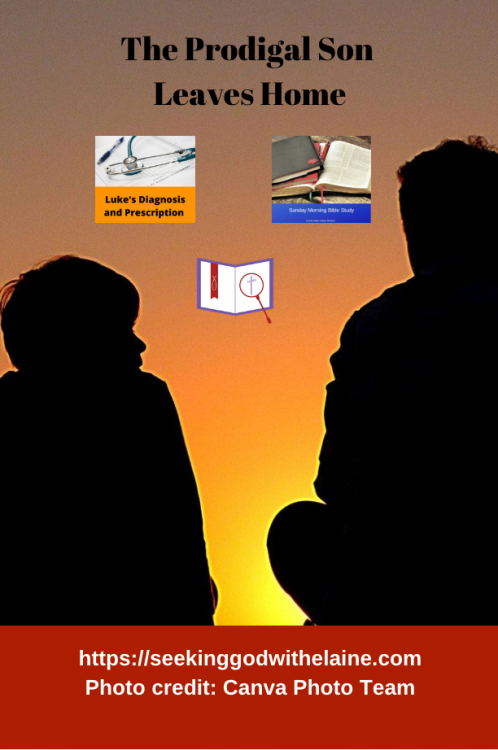Jesus told the Parable of the Prodigal Son because it gives a perfect picture of our fall from God’s grace and His forgiveness when we repent and return to Him. This daily devotional looks at what the parable means and what it means to us.
Nuggets
- We, like the prodigal son, turn away from God.
- We, like the prodigal son, are far from God when we allow sin to rule our lives.
Devotions in the Luke’s Diagnosis and Prescription series
Devotions in the Parable of the The Prodigal Son series

My Ladies and I have really been enjoying this study in Luke. We usually don’t do two quarters in a row on the same book, but this has proven to be a gold mine.
What we are studying next is another one of the well-loved parables. It is the Parable of the Prodigal Son.
It is a significant number of verses, so it is going to be a couple of devotions. Since it has some different verse groupings, it may be interesting where I have to break it. It has a ton of sermons to look through, so I hope it doesn’t seem disjointed.
In other words, bear with me. The application will be at the end.
Jesus told this parable to the scribes and the Pharisees, but it seems strange that they were the intended audience.
Jesus was probably aiming this at the publicans and sinners in the crowd. Thomson wrote, “The publicans and sinners are never represented in the Gospels as influenced by the religious opinions which prevailed among the Jews, but rather as led by their feelings; just as the younger son is exhibited in the parable. They are, however, drawn as more easily instructed, and more susceptible of repentance and reformation.”
Resource
Let's Put It into Context
I have always scratched my head as to how the prodigal son was able to ask for his inheritance early — and why the father gave it to him! Foote explained it.
Asking for the inheritance while the father was still alive was a custom for Eastern law of inheritance. Foote wrote that it was custom for “…children [in Eastern countries to claim] their share of their father’s property during his lifetime, which, it appears, they were legally entitled to do, and with which demand, of course, the father could not refuse to comply.”
Resource
I get that the practice protects the children from abuse of their parents. Foote went on to say that there had to be some sort of determination that there was cause for this request.
I read it that the son can’t just get a wild hair and say, “I want my money now.” It appears there has to be some sort of significant rift in the father/son relationship.
It is also important to note that, when the younger son got what was due to him, the older son got his share, also. The first born always received a double portion.
I doubt that it was a total divide of the father’s estate. The father had to have kept at least some to provide for himself.
Glossary
The Prodigal Son Makes His Demand
“He also said, ‘A man had two sons. The younger of them said to his father, ‘Father, give me the share of the estate I have coming to me.’ So he distributed the assets to them” (Lk. 15: 11-12 CSB)
We, like the prodigal son, turn away from God.
Jesus told the parable where the son rebelled against his father. Oh, yes. The prodigal son is a good representation of mankind.
Do you want a list of the prodigal son’s sins?
- Greed
- Selfishness
- Self-indulgence
- Ungratefulness
- Materialistic
- Pride
- Bitterness
- Lust for what he doesn’t have
- Willfulness
- Extravagance
- Dissatisfaction
- Estrangement
Children naturally rebel against their parents. Sometimes, it is full out rebellion, which is bad.
What we want is for children to do it the right way and grow so they can live on their own, which is good.
The Lay Preacher summed up the prodigal son’s sins by saying they stemmed from his desire for independence. As one who has long been characterized as independent, part of me wants to jump up and down and justify.
Resource
But I see what the Lay Preacher meant. We cannot be independent from God and be His child. We have to be totally committed and submissive to Him.
Bottom line is the prodigal son imagined a better life out in the big world, as far away from his father as he could get. He wanted out from under his father’s authoritarianism. He wanted what he could get.
The focus of this parable was the break in the relationship between child and parent. It was instigated by the child, not the parent. There was no sign of love or gratitude on the prodigal son’s part.
It reads like the father was very successful. The inheritance sounds like it was a large amount.
The father in the parable represents our Heavenly Father. We definitely rebel against God.
The big difference between the two fathers, though, is our Heavenly Father did nothing that would grant us to win our inheritance early. Remember, there had to be cause for the request for the division of the estate.
Look what the prodigal son wanted. He only wanted his father’s worldly possessions.
The prodigal son didn’t want his father’s love. “… give me the share of the estate I have coming to me …” (Lk. 15: 12 CSB). He just wanted that to which he felt he was entitled.
Oh, yeah. Isn’t that right? We look for self-gratification. What can we buy to make us happy? Where can we move that is better than where we are at?
Robinson made an interesting statement as to why the prodigal son wanted to leave. He wrote, “But it is plain that the old father meant to be master there; and that was precisely the condition of life this impulsive youth resolved to escape.”
Resource
Isn’t that exactly why some rebel against God? We don’t want Him to be our master. We want to be in control of our own lives.
Let’s look at the King James Version a second. “… And he divided unto them his living” (Lk. 15: 12 KJV).
That stops us a second, doesn’t it?
But isn’t that what God did when He sent His one and only Son to die a horrible death for us? I’d say it was probably tantamount to dividing His heart.
The Prodigal Son Is Footloose and Fancy Free
“Not many days later, the younger son gathered together all he had and traveled to a distant country, where he squandered his estate in foolish living” (Lk. 15: 13 CSB)
We, like the prodigal son, are far from God when we allow sin to rule our lives.
Unfortunately, when family relationships get splintered to the level described in this parable, the children distance themselves from the parent. “… the younger son gathered together all he had and traveled to a distant country …” (Lk. 15: 13 CSB).
Note, it didn’t take long for the prodigal son to hit the road. It only took a couple of days, and he was history.
Dunning pointed out that the parable says nothing about the prodigal son asking for God’s direction. The son is not only abandoning his earthly father, but he is also turning his back on his Heavenly Father.
Resource
Notice what Aitken pointed out. The father didn’t try to stop the son. He let him be independent. He let him go.
Resource
The son had his free will, and he used it. Free will is the ability within us to make decisions, which determine actions that produce character.
God can’t be a true Father to us if we don’t allow Him to be. We can’t come to Him and demand our inheritance — or that He give us what we want.
Salvation requires more than us believing there is a God. The Homilist wrote, “It is one thing to have the conviction that God made us, and another to be assured that He loves us with as much individual tenderness as if no other created being existed.”
Resource
Notice that the prodigal son went to a distant country. That means, according to Alexander, that sin greatly distances us from God.
Resource
Think about what this banishment would have entailed. It said that the prodigal son “… gathered together all he had …” (Lk. 15: 13 CSB), but that probably wasn’t much. It sounds like he was still living with his father, so no household stuff. Maybe a servant or two went with him, but no friends. By the time Jesus’ story started, it sounds like he was alone — “… but no one would give him anything” (Lk. 15: 16 CSB).
But look what the verse really says. The prodigal son “…traveled to a distant country …” (Lk. 15: 13 CSB). It doesn’t say he moved there and became a citizen. He had no rights within the new country.
Oh, yeah. Isn’t it said that the party friends are in the life only while the party is going on? If he was alone, they had moved on to the next party.
Another thought to ponder. It does not tell us how long it took before the party was over. It probably took some time before he hit rock bottom. Then it probably took some time for for the end to occur.
At this point, though, the prodigal son’s party is over.
In the next devotion, we will look at what happened when the prodigal son hit rock bottom.

Making the Connections
We can be like the prodigal son. Look back at the list of sins and decide the ones with which you struggle.
Loving, patient Heavenly Father. You love us so much. You did divide Your heart. You love Your Son so much, but You also love us — Your problem children. We are Your prodigal sons and daughters. We turn our backs on You and runoff to find our own parties. Be with us as we hit rock bottom show us our way back to You. Guide us home. Amen.
What do you think?
Leave me a comment below (about this or anything else) or head over to my Facebook group for some interactive discussion.
If you don’t understand something and would like further clarification, please contact me.
If you have not signed up for the email daily or weekly providing the link to the devotions and the newsletter, do so below.
If God has used this devotion to speak with you, consider sharing it on social media.
Pingback: The Prodigal Son Hits Rock Bottom – Seeking God with Elaine
Pingback: The Prodigal Son Returns Home – Seeking God with Elaine
Pingback: The Older Son Has a Problem, Too – Seeking God with Elaine
Pingback: John the Baptist’s Tough Message – Seeking God with Elaine